
German postcard by Photochemie, Berlin, no. K. 2147. Photo: Nordisk Film. Lilly Jacobson as Marya, the Martian leader's daughter, in Himmelskibet/Das Himmelschiff (Holger-Madsen, 1918).
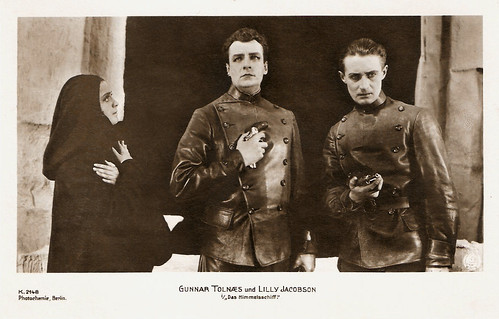
German postcard by Photochemie, Berlin, no. K. 2148. Photo: Nordisk Film. Publicity still for Himmelskibet/Das Himmelschiff (Holger-Madsen, 1918) with Lilly Jacobson as Marya, Gunnar Tolnaes as Avanti Planetaros, and Alf Blütecher as his friend Dr. Krafft.
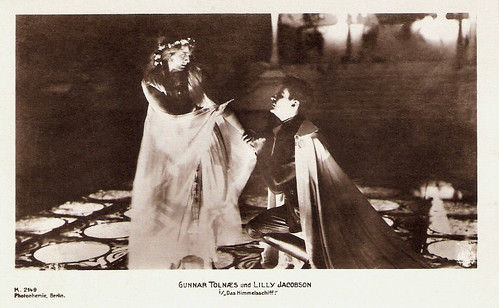
German postcard by Photochemie, Berlin, no. K. 2149. Photo: Nordisk Film. Lilly Jacobson and Gunnar Tolnaes in Himmelskibet/Das Himmelschiff (Holger-Madsen, 1918).
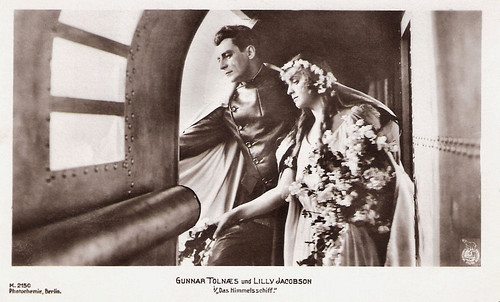
German postcard by Photochemie, Berlin, no. K. 2150. Photo: Nordisk Film. Lilly Jacobson and Gunnar Tolnaes in Himmelskibet/Das Himmelschiff (Holger-Madsen, 1918).

German postcard by Photochemie, Berlin, no. K. 2151. Photo: Nordisk Film. Lilly Jacobson as Marya, the Martian leader's daughter, and Gunnar Tolnaes as Avanti Planetaros in Himmelskibet/Das Himmelschiff (Holger-Madsen, 1918).
A trip to Mars
Himmelskibet/A Trip to Mars (Holger Madsen, 1918) is one of the first Space Operas. The story was based on Sophus Michaëlis' novel 'Himmelskibet' and adapted by the author himself and Ole Olsen. Frederik Fuglsang and Louis Larsen were the cinematographers. The production designer was Carlo Jacobsen and the art director was Axel Bruun.
Himmelskibet concerns Captain Avanti Planetaros (Gunnar Tolnaes) and his trip with his space ship Excelsior to Mars. On Mars, Avanti finds a race of white-robed, mystic vegetarians, and he enlists the services of Marya (Lilly Jacobson), the daughter of the local High Priest and leader (Philip Bech).
Among the cast are also Zanny Petersen as Corona, Avanti's Sister, Nicolai Neiiendam as their father, the Astronomer Professor Planetaros, Alf Blütecher as Avanti's Friend Dr. Krafft, and Nils Asther in an uncredited bit part as a Martian. On Mars, Avanti converts to pacifism and returns to Earth to spread the message. Before long, peace breaks out all over the planet and a well-placed bolt of lightning quickly wipes out the only resistance to this creed.
Freeman Williams writes in his Bad Movie Report about the social context of the film, the First World War, in which the film was produced: "Himmelskibet was released in February of 1918, nine months before the cease-fire with Germany was signed, which meant that for its entire shooting schedule, one of the most horrific wars yet seen was raging on with no signs of letting up. (...)
Given that, the tenor of the story is perfectly understandable, and Himmelskibet works better perhaps as a parable than it does as a science fiction or cautionary tale." Bad Movie Report rates the film as: 'Teetering on the brink of greatness. A good time' and adds 'Sweet movie. And save us, Space Hippies!'

German postcard by Photochemie, Berlin, no. K. 2152. Photo: Nordisk Film. Still from Himmelskibet/Das Himmelschiff (Holger Madsen, 1918) with from left to right Alf Blütecher as Dr. Krafft, Zanny Petersen as Corona Planetaros, Lilly Jacobson as Marya, Gunnar Tolnaes as Avanti Planetaros, and Nicolai Neiiendam as professor Planetaros, father of Corona and Avanti.
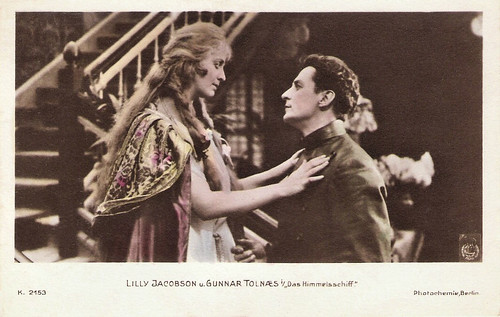
German postcard by Photochemie, Berlin, no. K. 2153. Photo: Nordisk Film. Lilly Jacobson and Gunnar Tolnaes in Himmelskibet/Das Himmelschiff (Holger Madsen, 1918) with .

German postcard by Photochemie, Berlin, No. K. 2155. Photo: Nordisk Film. Gunnar Tolnaes and Lilly Jacobson in Himmelskibet/A Trip to Mars (Holger-Madsen, 1918).
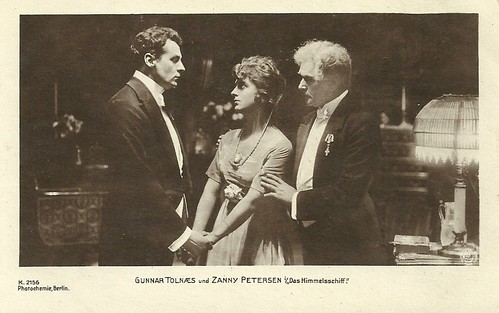
German postcard by Photochemie, Berlin, no. K. 2156. Photo: Nordisk Film. Publicity still for the Science Fiction film Himmelskibet/Das Himmelschiff (Holger-Madsen, 1918) with Gunnar Tolnaes, as captain Avanti Planetaros, Zanny Petersen as his sister Corona, and Nicolai Neiiendam as their father, the astronomer professor Planetaros.

German postcard by Photochemie, Berlin, No. K. 2157. Photo: Nordisk Film. Gunnar Tolnaes in Himmelskibet/A Trip to Mars (Holger-Madsen, 1918).
A true oddity
Rhys Hughes at VideoVista rates Himmelskibet/A Trip to Mars (Holger-Madsen, 1918) among the Top 10 of Early Fantasy Films: "A true oddity this and a film that initially seems ahead of its time in many ways. (...) Despite the flower power trappings, the beads and robes and the consumption of lentils, Himmelskibet is really a reaction to the outbreak of WWI rather than an accurate prediction of the 1960s' alternative culture. Less surprisingly, perhaps, it stands alone as an example of early Danish fantasy cinema."
After Himmelskibet (1918), Denmark did not make another Science Fiction film until Reptilicus (Sidney W. Pink, 1962) starring Bent Mejding and Ann Smyrner.
Himmelskibet was believed to be by and large a lost film for many years, until the Det Danske Filminstitut (Danish Film Institute) located a fairly complete copy and set to restoring it. In 2006, nearly ninety years after its initial appearance, Himmelskibet (1918) was re-released on DVD by the Danish Film Institute.
At IMDb, Mart Sander reviews the DVD: "This film is a total orgy of enjoyment. The double feature released by the Danish Film Institute (together with a disaster film from 1916, The End Of The World) boosts their usual superior quality. The Danes began storing and archiving their films very early, so you get a very clean second-generation copy from a period when most of the US films withdrawn from circulation went to the glue or comb factory.
It's a pity this film with so many different locations isn't color tinted. The rather uninspired piano accompaniment, another trade mark of the series from the DFI, tends to grow a bit tedious too. But nevertheless, a remarkable film and something you can show to your friends without being afraid that they'll think you're a weirdo."
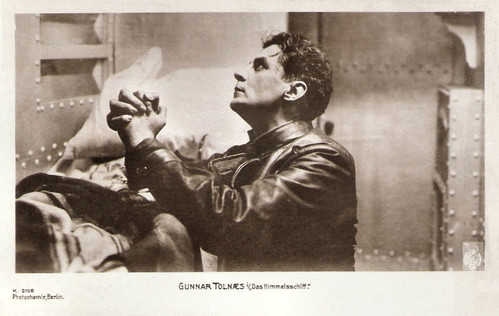
German postcard by Photochemie, Berlin, no. K. 2158. Photo: Nordisk Film. Gunnar Tolnaes in Himmelskibet/Das Himmelschiff (Holger-Madsen, 1918).

German postcard by Photochemie, Berlin, No. K. 2159. Photo: Nordisk Film. Gunnar Tolnaes in Himmelskibet/A Trip to Mars (Holger-Madsen, 1918).
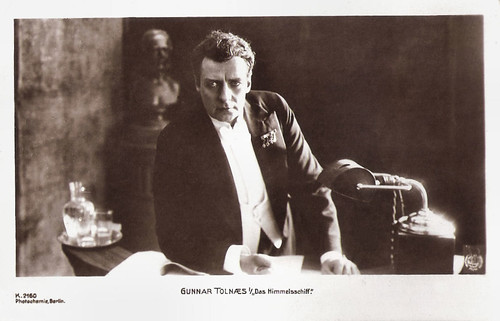
German postcard by Photochemie, Berlin, No. K. 2160. Photo: Nordisk Film. Gunnar Tolnaes in Himmelskibet/A Trip to Mars (Holger-Madsen, 1918).
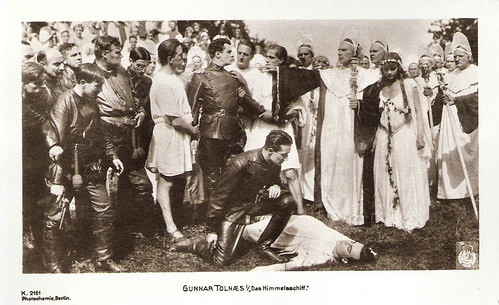
German postcard by Photochemie, Berlin, no. K. 2161. Photo: Nordisk Film. Publicity still for Himmelskibet/Das Himmelschiff (Holger-Madsen, 1918) with Gunnar Tolnaes as Avanti Planetaros, Philip Bech as the Martian leader, Lilly Jacobson as Marya, the Martian leader's daughter, Alf Blütecher (kneeling) as Avanti Planetaros' friend Dr. Krafft and Nils Asther as the fallen Martian.
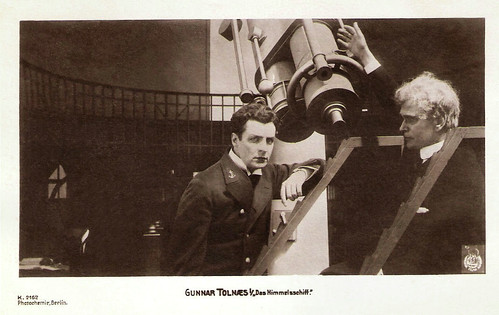
German postcard by Photochemie, Berlin, no. K. 2162. Photo: Nordisk Film. Gunnar Tolnaes as Avanti Planetaros and Nicolai Neiiendam as his father, the astronomer professor Planetaros in Himmelskibet/Das Himmelschiff (Holger-Madsen, 1918).
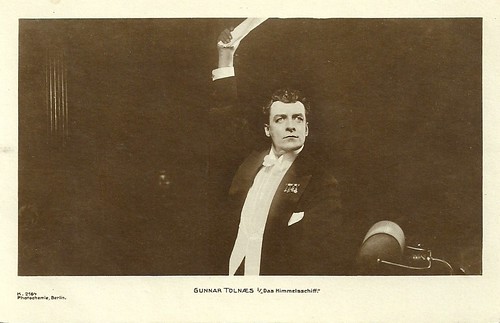
German postcard by Photochemie, Berlin, no. K. 2164. Photo: Nordisk Film. Gunnar Tolnaes in Himmelskibet/Das Himmelschiff (Holger-Madsen, 1918).
Sources: Mart Sander (IMDb), Rhys Hughes (VideoVista - now defunct), Freeman Williams (The Bad Movie Report), Wikipedia and IMDb.
This post was last updated on 24 February 2024.
Just a note to say that the Lusitania ship, on which Jacobson travelled and made a documentary about in 1914, was NOT the sister ship of the Titanic. The Titanic’s sister ships were Britannic and Olympic.
ReplyDeleteThanks for the information. We'll correct it in the post.
ReplyDelete